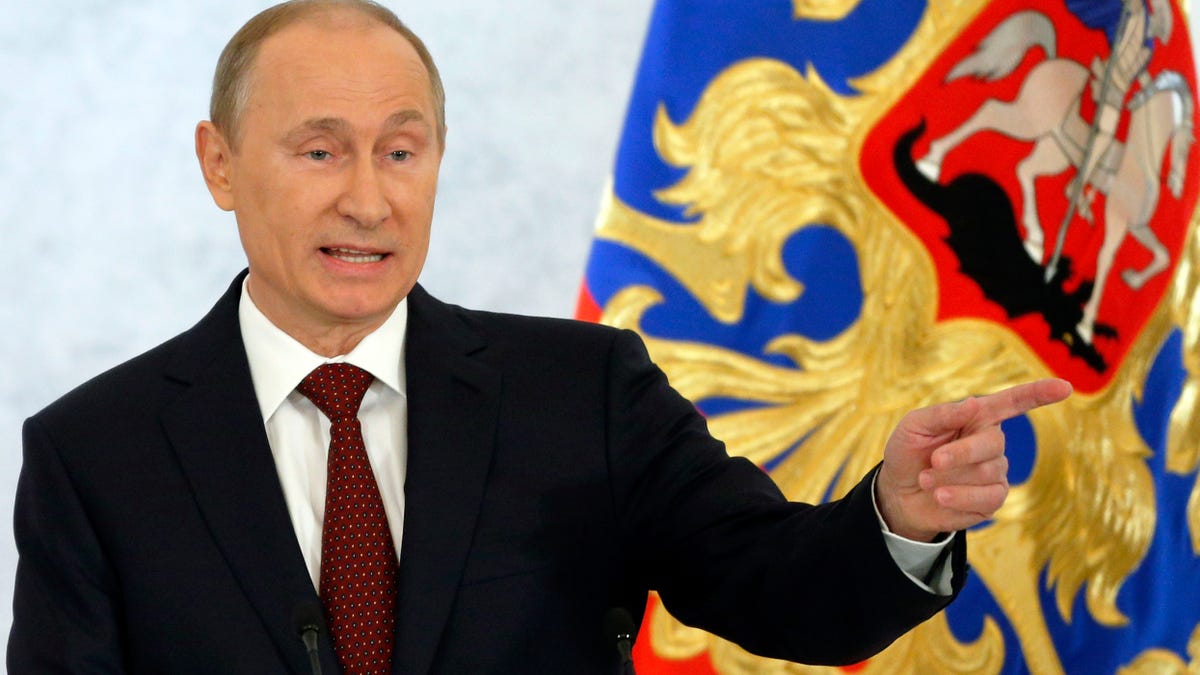
Dec. 12, 2012: Russian President Vladimir Putin speaks during a state-of-the nation address in Moscow, Russia. (AP)
MOSCOW – Thousands of opposition supporters gathered Saturday outside the old KGB headquarters in central Moscow to mark a year of mass protests against Vladimir Putin and his government.
The turnout was far smaller than the tens of thousands who filled Moscow streets in protests that erupted after fraud-plagued parliamentary elections last December. But unlike most of those protests, Saturday's gathering was not authorized and those who came risked arrest and heavy fines.
Soon after Putin returned to the presidency in May, Russia passed a law raising the fine for participating in unauthorized rallies to the equivalent of $9,000, nearly the average annual salary.
Even if the protest had been authorized, the opposition would have struggled to draw a crowd. Enthusiasm for street demonstrations has waned, in part because of disillusionment with the opposition leaders, while polls show that discontent with Putin's government has continued to rise.
Police dispersed the rally after 2 1/2 hours. Several prominent opposition figures were among dozens detained in the course of the gathering, but all were released within hours.
There was a heavy police presence around the approximately 3,000 people who came to Lubyanka Square for the rally. The square is outside the headquarters of the Federal Security Service, the main successor agency of the Soviet KGB.
The square also holds the Solovetsky Stone, a monument to the victims of political repression during the Soviet era. The stone comes from the Solovestky archipelago, the site of early prison camps considered the beginning of the Gulag system.
Many rally participants laid flowers at the stone, among them Boris Nemtsov, a veteran Russian politician now in the opposition.
"The people who have come here are free, honest and decent people," Nemtsov said "I'm very proud of our people, of Muscovites, of Russians. They (the government) wanted to scare us, there's a helicopter flying over us and they've surrounded us with policemen. They think that we're slaves, but we're not. We're free people, and thank God for that."
About 90 minutes into the rally, police arrested about a dozen people who were walking around the monument chanting "Free political prisoners."
Earlier, police detained protest leaders Sergei Udaltsov and Alexei Navalny, along with other prominent opposition figures including Ilya Yashin and Ksenia Sobchak, a glamorous TV personality.
"They fear their citizens, they fear their people. But you can't forbid the people (from coming)," Udaltsov said shortly before he was bundled into a police van.
One person who braved frigid temperatures of minus 15 Celsius (5 degrees Fahrenheit) and the threat of huge fines to come to Saturday's gathering was 67-year-old Andrei Lyakhov, a retired physicist.
"At a minimum, the government will understand that there is some kind of opposition," he said about why he came.
Lyakhov noted that the protest mood of the past year had put pressure on nominal opposition parties in Russia's parliament to criticize the dominant Kremlin party, producing some of the most contentious debates in years. "This pressure on the government, even if we don't succeed in changing the government, this pressure will force it to do something," he said.
The goal, Lyakhov said, is a real democracy that allows a change of leadership. Putin, whose term runs through 2018, has already been in power for nearly 13 years.







































